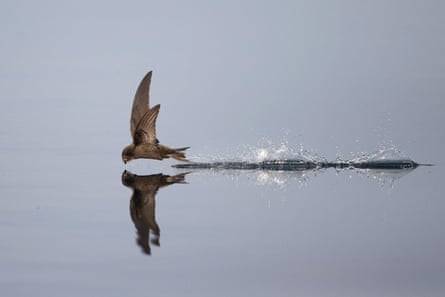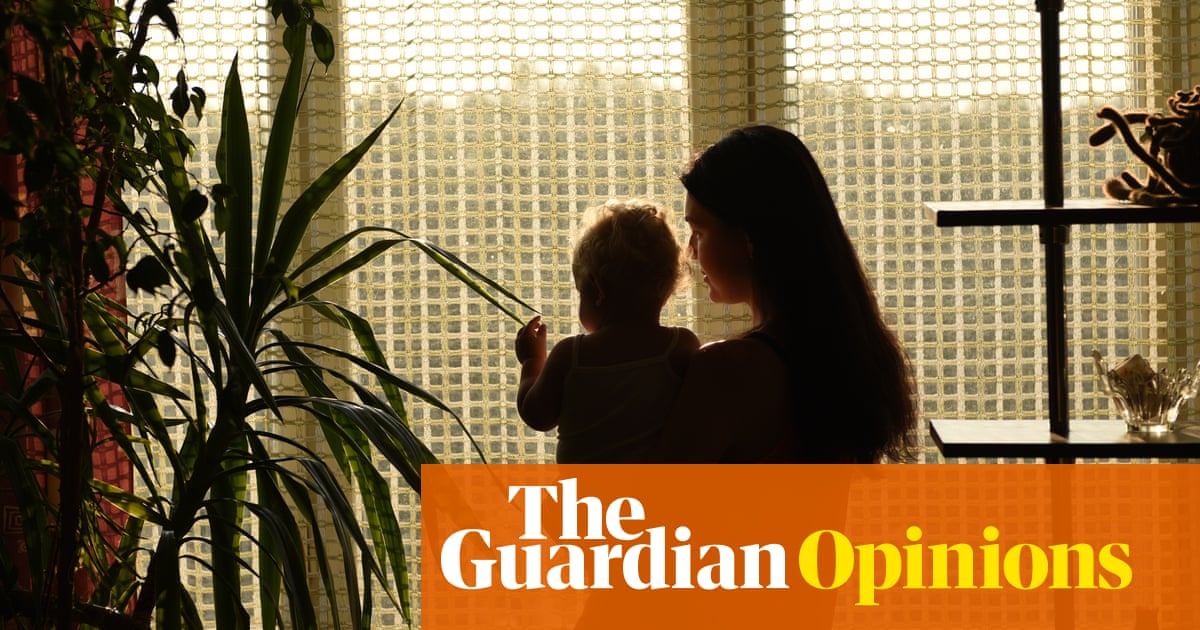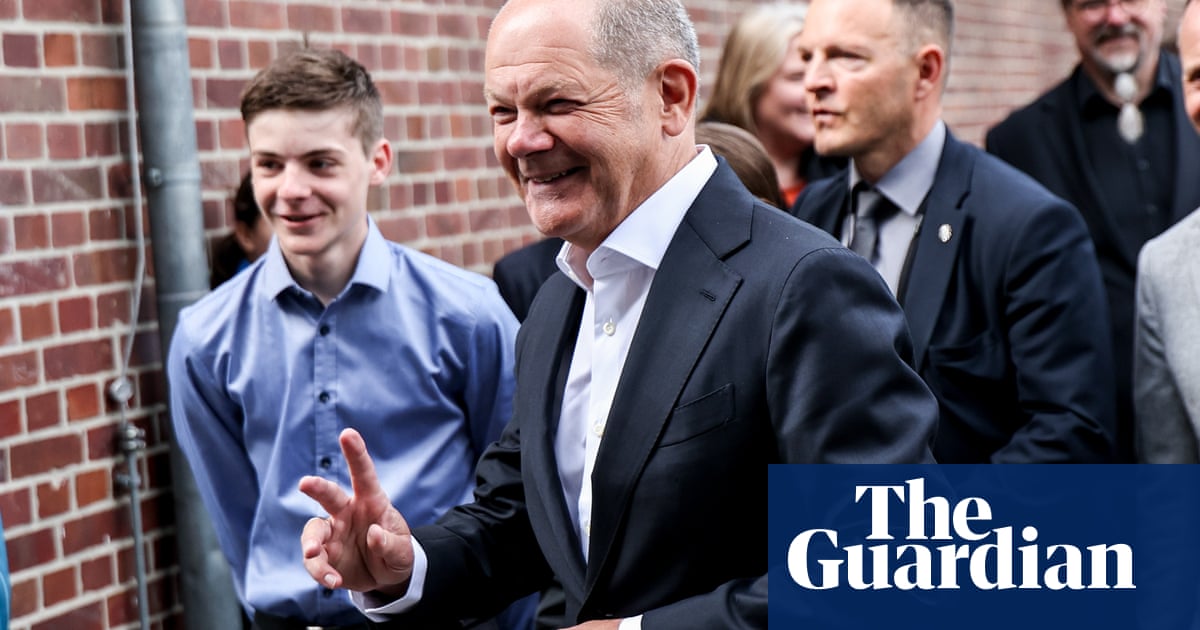On more than 50 occasions over the past three years, Hannah Bourne-Taylor has lugged an oversized brick through the parliament’s security screening.
Security staff know her fondly as “the swift brick lady”. But now Bourne-Taylor is having to ruffle political feathers over what appears the simplest of nature-friendly measures – a small legal clause requiring all new dwellings to include a £35 hollow brick, providing homes for endangered cavity-nesting birds including swifts, house martins, sparrows and starlings.
After walking naked except for a thong through London – twice – to raise awareness of the plight of swifts, winning a parliamentary debate and cross-party support for the brick, Bourne-Taylor is facing her greatest foe yet: a Labour government terrified of voters defecting to Reform.
After strongly supporting Bourne-Taylor’s swift brick amendment in opposition, the Guardian understands that senior Labour ministers have privately told backbenchers that the government will whip against a new swift brick amendment tabled for the controversial infrastructure and planning bill. A government source says the amendment is still being considered.

“The hypocrisy is just staggering,” said Bourne-Taylor. “I’ve heard that No 10 and Angela Rayner are worried of doing anything that’s deemed woke, and nature is in that bracket. They’re terrified about Reform and Trump. And so they don’t want to do swift bricks because it sounds a bit lefty. But nature has absolutely no business being woke or anti-woke. That’s a big problem.”
It’s difficult to grasp why it’s been so difficult to tweak legislation to ensure new houses include one £35 brick but Bourne-Taylor’s illuminating new book, Nature Needs You, reveals the dirty politics blighting her against-all-odds, one-woman campaign.
According to Bourne-Taylor, multibillion profit-making housebuilders have signalled in high-level government meetings they have no objections to the bricks, which are widely made by conventional brick manufacturers. There is already a British Standard for them, which means there’s no government investment required for development, guidance or standardisation.
The bricks enable new houses to boost nature, especially the drastically declining swift, whose UK populations slumped by 66% between 1995 and 2022. Swifts once nested in caves and hollow trees but moved into house roofs centuries ago – until modern insulation and renovations have left them homeless. There are barely 40,000 breeding pairs left in Britain.
As Bourne-Taylor argues, swifts and other cavity-nesting species are urban birds that bring joy to millions of city-dwellers. “We like seeing birds out of our window,” she said. “It isn’t about people or birds, it’s about life. Why on earth would any government build millions of homes that will be sterile to one of our closest ways of accessing nature? Why take away something that someone who’s old, young or immobile can see out of their window? That’s more than illogical – it’s irresponsible.”

Bourne-Taylor’s new book – published this week as swifts return to Britain from sub-Saharan Africa – includes a memorable encounter with an unnamed environment secretary in which the minister tells Bourne-Taylor she ought to be grateful for the hearing she had been given; Bourne-Taylor finally snaps and accuses the minister of speaking “bullshit”.
She was inspired to take action when she saved the lives of swift families whose nest holes in a roof were unwittingly blocked by a resident in her Oxfordshire village, vowing there would be a new law to help their offspring find safe nest spaces by the time they were mature three years later.
“They’ll now be prospecting this year and I’ve failed them at the moment,” she said. “I made it my business and now it’s become almost solely my business. It’s a 50m-year-old existence weighing on my shoulders.”
Bourne-Taylor, an author who has ghostwritten bestselling books including Anne Glenconner’s Lady in Waiting, may have joined the ranks of reforming female environmentalists from Emily Williamson and Eliza Phillips, who stopped the bird-killing plumage trade with a new law in 1921, to contemporary campaigners such as Mary Colwell, who championed the new natural history GCSE and Georgina Downs, who has challenged toxic pesticides.
But she admits she has found it agonising campaigning for this small legal step. “I wake up every day and wonder whether I can just run away. This is very stressful. It’s emotionally, physically and financially crippled me. And the reason I’m doing it is because I have a voice. The swifts don’t have a voice.”
During her campaign, she’s been trolled by everyone from ministers to abusive internet trolls. “The worst ones are not the horrible violent ones, it’s the relentless, patronising criticism from nature lovers – ‘This is just one species, this is not going to solve the nature crisis.’ Firstly, [the brick] is not just for one species. And secondly, you’d like little old me to stop pesticide use? Let me just get on that right now. We shouldn’t just get Chris Packham to do everything. The nature crisis is on us.”
In private, says Bourne-Taylor, politicians “always say things like: ‘Oh, legislation is very hard.’ That’s your job. Do your job. A senior Labour minister told me that [housing minister] Matthew Pennycook was getting irritated by the mention of swift bricks, implying that I should pipe down. How about you just do it and then I’ll go away?”
after newsletter promotion
After attracting 109,896 parliamentary petition signatories and a Westminster debate, Bourne-Taylor’s staunchest political ally has proven to be Zac Goldsmith, the Conservative peer who first tabled an amendment to bring swift bricks into law.
Lord Goldsmith – “incorruptibly loyal to nature”, according to Bourne-Taylor – has gamely walked to high-level political meetings beside the naked campaigner, sparking unfounded tabloid tittle-tattle about a romance.

Bourne-Taylor has also been encouraged by support from the environment secretary, Steve Reed, but fears his enthusiasm for swift bricks has been overruled by No 10’s pushback against bats, newts and other supposedly development-blocking wildlife.
“Steve Reed is a good egg for swifts,” said Bourne-Taylor. “I trust his integrity but it’s like he’s a small little kid in the playground and the bigger people are coming and nicking his lunch money.”
A spokesperson for the Ministry of Housing, Communities and Local Government said: “The national planning policy framework already expects developments to provide net gains for biodiversity, including support for priority or threatened species such as swifts, bats and hedgehogs.
“This is alongside our planning and infrastructure bill, which will deliver a win-win for the economy and nature – introducing the nature restoration fund to unblock the building of much-needed homes and infrastructure and funding large-scale environmental improvements across whole communities.”
It appears that the future of the imperilled swift may be determined by whether Labour MPs are willing to push back against No 10 and vote for the swift brick amendment tabled by the Labour MP Barry Gardiner.
“This amendment is for the sole category of wildlife directly dependent on buildings to survive,” said Bourne-Taylor. “Not only will bricks never block development – they’re bricks! – but without them, these birds don’t have a future in the UK. If they can’t breed, they can’t exist. A simple brick can save them.
“As a human in power, whether the CEO of a big housebuilder or Angela Rayner or the prime minister, why wouldn’t you take that opportunity to do something that was clearly beneficial, not just for birds but for people?”

 3 hours ago
8
3 hours ago
8













































